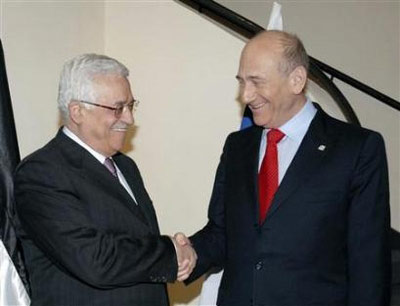Israeli Prime Minister Ehud Olmert promised not to build any new Jewish settlements during a meeting with Palestinian National Authority (PNA) Chairman Mahmoud Abbas on Thursday, an Israeli official told Xinhua.
Palestinian President Mahmoud Abbas (L) and Israel's Prime Minister Ehud Olmert shake hands during their meeting in Jerusalem Dec. 27, 2007. (Xinhua/Reuters Photo)
Olmert made the pledge during the meeting with Abbas at his residence in Jerusalem, first of its kind since the two were back from Annapolis peace conference held late November.
Olmert promised during the two-hour meeting that Israel would not build any new settlements and would stop expropriating land in the West Bank, said David Baker, an official with the Prime Minister's Office.
"This is a positive meeting. Both sides repeated their commitment to the Roadmap and make continued progress in the negotiations," he said.
The two leaders will keep on the mechanism of biweekly meeting. According to local daily Ha'aretz, Olmert told Abbas that Israel "will take no steps that will hurt our ability to arrive at final status negotiations with the Palestinians."
He underlined that Israel wants to carry out the negotiations "in good faith," the report added.
However, Olmert did not guarantee Abbas that Israel would not expand settlement in Har Homa although the leaders agreed that the two sides would refrain from taking any steps that would hinder efforts to reach a permanent peace agreement.
Israel's Prime Minister Ehud Olmert (R), Palestinian President Mahmoud Abbas (2nd R), chief Palestinian negotiator and former prime minister Ahmed Qurie (2nd L), and Israel's Foreign Minister Tzipi Livni (L) stand together during their meeting in Jerusalem Dec. 27, 2007. (Xinhua/Reuters Photo)
"The prime minister has not promised to freeze tenders that have already been published and are already underway," a senior Israeli official was quoted by local daily Yedioth Ahronoth as saying.
The Palestinians are particularly upset over a tender by Israeli Ministry of Housing and Construction for the building project of 307 housing units in the southeast Jerusalem neighborhood of Har Homa, on the Palestinian side of the Green Line.
On Wednesday, Palestinian sources said Abbas had conditioned the advancement of the peace talks on the immediate halt of all settlement construction, adding that additional gestures are required by Israel in order to increase the Palestinian people's trust in their president.
Laborers work at a construction site in the West Bank Jewish settlement of Maale Adumim Dec. 27, 2007. (Xinhua/Reuters Photo)
Hours before Thursday's summit, a spokesman for Abbas had said that President Abbas would ask Olmert to freeze settlement activities in the Palestinian lands.
"The president will be very clear: the building of settlements must stop first," Nabil Abu Redina told Voice of Palestine radio.
"The negotiations must be serious with a real launching and without procedures blocking them," said the spokesman.
Thursday's summit was also attended by the negotiating teams from both sides, which were headed by Israeli Foreign Minister Tzipi Livni and former Palestinian prime minister Ahmed Qurei respectively.
The negotiating teams concluded their second round of peace talks on Monday without yielding any result or progress as the two sides persisted in their own concerns. The Palestinians insisted that Israel should stop settlement expansion, while Israelis demanded an improved security mechanisms from the Palestinian side.
President George W. Bush stands on stage with Israel's Prime Minister Ehud Olmert and Palestinian President Mahmoud Abbas at the Israel-Palestinian Peace Conference at the U.S. Naval Academy in Annapolis, Nov. 27, 2007. (Xinhua/Reuters Photo)
Abbas and Olmert have been meeting regularly since June when Hamas took over Gaza and routed pro-Abbas security forces.
Since Annapolis meeting, Israel has also disclosed plans for new construction in 2008 within the Maale Adumim settlement which the Jewish state hopes to keep as part of any final peace deal.
The White House announced in early December that U.S. President George W. Bush will visit the Middle East in January to press the Israelis and Palestinians to restart installed peace talks. A senior official in Jerusalem said both sides are waiting for Bush's visit in the hope that the U.S. leader will push the process towards a breakthrough.
(Xinhua News Agency December 28, 2007)





